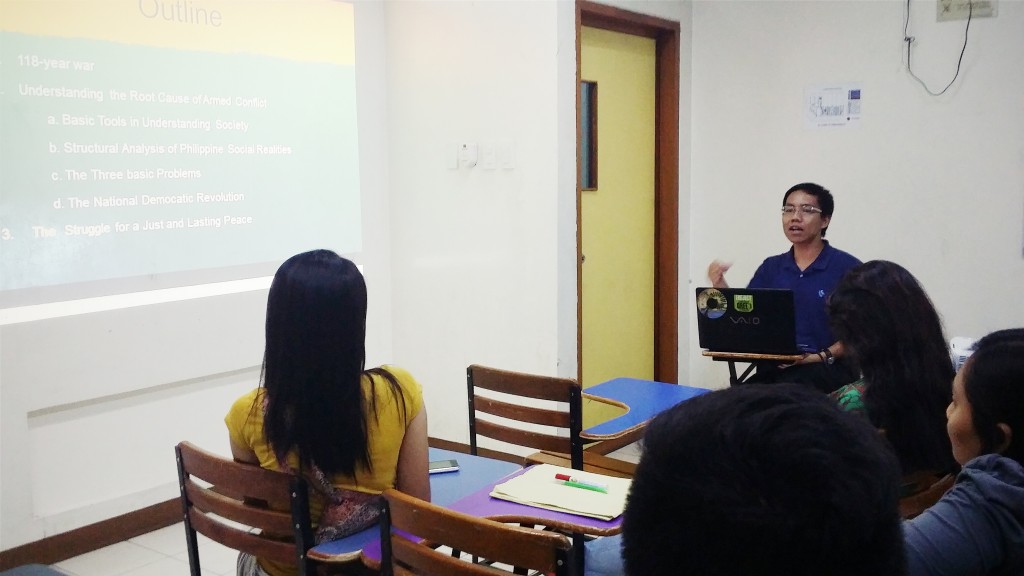Renowned physicist and environmental advocate Kim Gargar was in room J203 of the Jubilee Building last Wednesday, September 10, to give students a discussion about the Philippines’ struggle, culture, and longing for a just and lasting peace.
Gargar is an environmentalist from PANALIPDAN, a progressive environmental network, and a former physics professor of MAPUA Institute of Technology, the Polytechnic University of the Philippines and the University of the Philippines – Diliman. He pursued his doctoral degree in Chronobiology at the University of Groningen, Netherlands. Last October 1, Gargar was captured by members of the Army while on a research mission in a typhoon ‘Pablo’-stricken area of Davao Oriental, and was wrongfully tagged as a member of the New People’s Army after being caught in the middle of an Army-NPA clash. He was released last August 1.
In the talk, Gargar stressed his belief that the Philippines is rich, but the difficulty lies in the struggle of the Filipino people, and that “just and lasting peace can only come when the peoples’ economic, political, and cultural rights are respected.”
With the Philippines being one of the world’s most mineral-rich countries, Gargar said that the country has potential to develop. He also said that even weather disturbances can be taken advantage of.
“We can even harness energy from storms,” he explained.
Gargar further explained that with vast lands, labor force, biodiversity, agriculture, oil, and other resources, the Philippines need not depend on external sources, but should be self-reliant. “We can be self-reliant if only we learn to exploit our resources,” he stressed.
Gargar also presented one pressing matter in the discussion. Despite the country’s rich natural resources, the struggle of the Filipino people is ongoing. Gargar presented data that revealed 69 million Filipinos, or around 80% of the country’s population, make do with barely P96.00 a day. From Ibon’s databank, it was found that in every 100 families, 46 are unable to meet even minimum nutritional needs, 35 do not have access to potable water, and 48 do not have electricity. 60 do not own a house, 10 are unemployed, while 40 are not able to send their children to school. Additionally, 20 will have to resort to child labor for income.
Gargar reiterated that to be able to eat is a basic human right. Being unable to eat is having your rights violated, he said.
“Economic rights are also human rights. If you don’t even get to eat, they already your rights are being violated”, he explained.
Gargar correlated the Philippine society and economy, saying that each mirrors the other. “Culture is like a mirror where we can see our society. It reflects our economic status. Whereas, economic culture reflects society,” he said.
Gargar further explained that even the mere titles that we attach to authority such as ‘Ma’ams and Sirs might be indicators of unequal economic status. He added that even education, literature, and the media not only mirror social and economic culture, but are the most potent tools in changing or molding it. One thing needed to be changed, he said, is the lingering colonial mentality. “Whenever we see someone with white skin, we feel inferior,” he said.
Gargar says that part of his advocacy is to educate the Filipinos about society, hence the educational discussion. He added that the purpose is to empower the Filipinos to be “agents for meaningful social change.”
“We can’t work for social change without first understanding our society, so EDs (educational discussions) are important,” added Gargar.
Gargar, being a scientist, says culture reflects science and technology in the Philippines. He says that scientists have opportunities to work in the country side, but often choose to work outside the country. “Scientists leave the Philippines for at least two reasons: colonial mentality and lack of genuine industrialization. So [the] educational system is to be blamed, plus the neglect of the government,” he explained. When asked what his message for them would be, he answered, “Don’t leave the country. Serve the people.”
